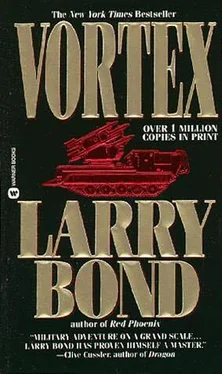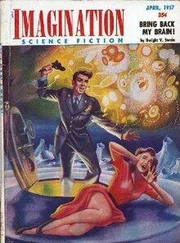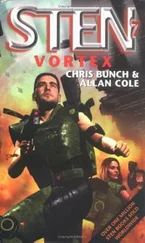“
“Scuse me, Prof. Hot stuff coming through.”
Levi moved aside as a file of heavily laden Rangers started thumping down the stairs onto the tarmac and then across to the hangar apparently selected as temporary quarters for the battalion. Under their distinctive black berets, the soldiers looked more like pack mules than men-each piled high with his personal weapons, extra rifle ammunition, grenades, spare ammo belts for machine guns, mortar and recoilless rifle rounds, canteens, medical supplies, and anything else the battalion quartermasters thought might be needed.
The Rangers, already tired from days and nights of backbreaking practice and drill, were exhausted-worn-out by a grueling ten-hour plane flight in cramped conditions. Looking at their weary faces, Levi began to understand
O’Connell’s and Carrerra’s absolute insistence that their battalions spend at least a full day on Ascension to rest, recuperate, and make final preparations.
The Israeli scientist’s own aching muscles and bruises were a constant reminder of the last two hectic days. The Ranger battalion’s jumpmasters had driven him hard, almost mercilessly, through an accelerated course of classroom instruction and drill-everything except a real parachute drop from a real plane. O’Connell had vetoed this final step because he did not want to risk Levi’s suffering a jump-related injury. Even a sprain would scratch him from the mission.
Levi shuddered. Jumping out of a perfectly sound airplane in broad daylight had sounded bad enough. Jumping out of one into pitch darkness, without any practice, seemed utterly insane.
His teachers hadn’t been the least bit sympathetic.
“You need to know this stuff cold, Mr. Levi,” one hard-bitten sergeant had said, ” ‘cause a nuclear expert who breaks his neck on landing ain’t much of an expert and he ain’t much use. ” Well, that was true enough, he thought wryly. At least the Americans wanted him alive long enough to identify the South African nuclear weapons and to prepare them for the airlift out.
He spotted O’Connell striding purposefully toward the airfield’s small terminal and control tower, keeping pace with the taller, older man beside him. Seemingly agreeing with something the other man said, the
American lieutenant colonel nodded once. His face was strangely blank, as though all his emotions and feelings were being held rigidly in check.
Levi suddenly realized that the taller Ranger officer must be this
Colonel Gener he’d heard so much about-the 75th Ranger’s fire-eating regimental commander.
He shook his head, understanding O’Connell’s apparent constraint.
Although the lieutenant colonel had spent the past week preparing his battalion for this raid, now that they were finally on the way, Gener had shown up with every apparent intention of exercising de facto command.
Levi frowned. The U.S. Army operated under a strange concept of command and control. In Israel, the conduct of an important operation was always left in the hands of the unit commander. It was the best guarantee of victory and efficiency amid the bloody confusion of combat. But it seemed as though some in the American military treated combat command as nothing more than a routine way station on a career path-as a simple itsumd box to be inked in or crossed off and promptly forgotten.
He shrugged halfheartedly. Israel’s armed forces undoubtedly had their own weak spots. Of course, those weren’t quite so likely to get him killed in the next few days. With that cheery thought to keep him company, Levi hoisted his own small bag and walked toward the hangar that would be his home for the next day or so. He had a feeling that steep would be difficult to come by-despite his mind-numbing fafigm.
A deeply tanned man in a lightweight tropical suit came out of the terminal building and moved to intercept him.
“Professor Levi?”
Levi stopped. The other man’s accented English identified him. He answered in Hebrew.
“That’s right.”
“My name’s Eisner. I’m attached to the Washington, D.C.” embassy. I have several routine messages from home to pass on to you. Can we speak privately?”
Routine messages? Levi didn’t buy that for a moment. He’d seen too many other hard-eyed men like this one to be fooled. Diplomats were never in such good shape or so obviously humorless. But what did the Mossad,
Israel’s foreign-intelligence service, want with him? Or perhaps more importantly, what did his country’s spy service expect him to do?
He had a feeling he wasn’t going to like whatever it was.
ABOARD USS C4RL VINSON, IN THE INDIAN OCEAN
The normal buzz of good-natured banter and friendly insult died away completely as Rear Adm. Andrew Douglas Stewart entered the ready room.
Even aviators knew better than to ignore an admiral Stewart waved them back into their chairs and took his place behind a podium. He scanned the rows of suddenly tense young faces before him.
These men might pretend to be carefree and untroubled, but every one of them had to have a pretty good idea of what was in the wind.
The clues were all around. First, there was the fact that the Vinson and her escorts had been loitering a bare two hundred miles off the South
African coast for nearly two weeks. Second, the carrier’s air group had been run through a series of increasingly intense and realistic exercises over that same period. And finally, all communications with the outside world were being closely monitored and controlled. It all added up to a single inescapable conclusion: Washington was on the edge of committing the Vinson’s aircraft to a real shooting war. A war where one side had already dropped an atomic bomb without any show of regret or remorse.
“Good afternoon, gentlemen.” Stewart focused his attention on the pilots and naval flight officers in the room with him, knowing that video cameras would relay his words and image to the other squadron ready rooms and briefing rooms scattered throughout the
Vinson’s vast hull and superstructure.
“I’ll make this short and sweet.
Your respective squadron commanders and ops officers will go over the details after I’m done.”
He nodded to his chief of staff. The lights began dimming.
“I’m here to brief you on our part in a strike against South Africa’s nuclear capability.”
The room filled with a buzz of conversation, and a waiting aide laid a map overlay on the ready room’s overhead projector. The map showed a series of red lines converging on Pretoria. Most emanated from a tiny dot marking the Vinson’s position, but one line slanted in across all of southern Africa-coming east out of the Atlantic. A tag identified it as the flight path of Air Force transports carrying the two Ranger battalions and elements of the 160th Aviation Regiment.
Brave Fortune was just thirty-four hours away.
HEADQUARTERS BUNKER, 61 ST TRANSVAAL RIFLES, PELINDABA RESEARCH
COMPLEX
Col. Frans Peiper stood still for a moment, watching the rise and fall of hundreds of picks and shovels as his troops worked frantically to complete their fortifications.
Since its designation as a nuclear research center and weapons storage site, Pelindaba had been surrounded by a barbed wire fence and military guard posts Now it more closely resembled a fortress. Thirty meters inside the barbed wire, slit trenches now circled the entire compound, connecting an array of twenty-two concrete bunkers. Each bunker was large enough to shelter a reinforced rifle squad and sturdy enough to withstand heavy mortar fire. Minefields were being laid on the slopes outside the wire to channel attacking ANC guerrillas or Cuban commandos and armored vehicles into previously selected kill zones for the battalion’s recoilless rifles, machine guns, and mortars. Deadly looking armored
Читать дальше












